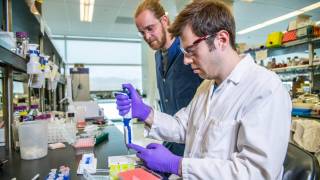New Path to Develop a Human Cytomegalovirus Herpes Virus Vaccine

A common herpes virus has been reported to be less prone to mutation than previously thought, a finding which could help develop a successful vaccine, University College London (UCL) researchers reported today.
The Human Cytomegalovirus (HCMV), is a DNA virus and a beta-herpesvirus which is one of the world's most common and widespread human infections.
While generally asymptomatic, HCMV is a concern for pregnant women, their unborn babies, and patients with a weakened immune system.
In the United States, HCMV accounts for 25 percent of children with sensorineural hearing loss.
For people with compromised immunity, especially due to organ transplantation, CMV infection can be fatal, says the Mayo Clinic.
This news is important, since HCMV affects between 45 percent to 100 percent of the adult population, depending on age and geographic area.
However, developing an HCMV vaccine has proved elusive.
Previous global research has shown that within a single individual HCMV has high genome (genetic) diversity, leading to theories that HCMV has a high mutation rate, which means, it's hard to develop a preventive vaccine.
Such a trait is normally seen in RNA viruses, such as HIV or Hepatitis C.
Now using new viral genome sequencing, bioinformatics and modeling tools developed at UCL, researchers have analyzed immunocompromised patient blood samples and shown HCMV is not mutating any more than other DNA viruses.
Instead, the frequent occurrence of mixed-infections caused by genetically different HCMV strains leads to findings of high genome diversity within an individual.
Lead author, Professor Judith Breuer (UCL Division on Infection & Immunity), said in a press release, "It has been claimed that HCMV is as diverse as the more error-prone RNA viruses which led to a lot of confusion in this field."
"Using our novel genome sequencing and bioinformatics modeling approaches, we have shown that the apparently high HCMV diversity seen in some clinical samples is caused not by HCMV mutation, but is due to frequent co-infection with multiple strains of HCMV.”
"Our study confirms for the first time that HCMV mutation rates are similar to other DNA viruses, providing some reassurance for the development of vaccines, as unlike the hyperdiverse RNA viruses, HCMV is unlikely to mutate to evade vaccines."
Professor Breuer concluded saying "The new bioinformatics methods for re-constructing individual genome sequences from a mixed infection will allow us to identify the factors, including recombination, that drive HCMV evolution in a patient, providing a precision approach to managing infections."
The study, funded by the European Union, has been published in Proceedings of the National Academy of Sciences. No conflicts of interest were disclosed.
Our Trust Standards: Medical Advisory Committee

























